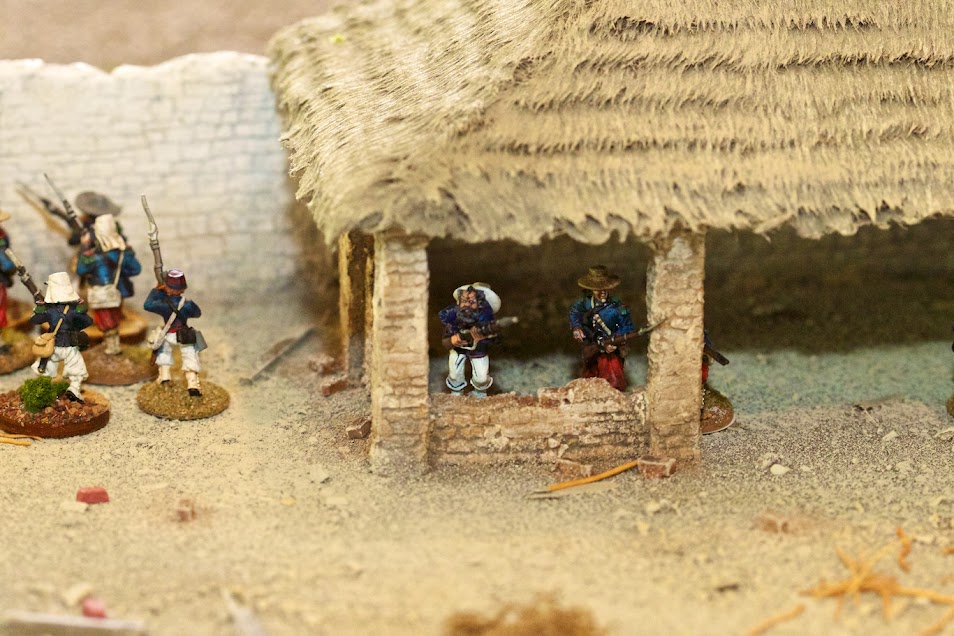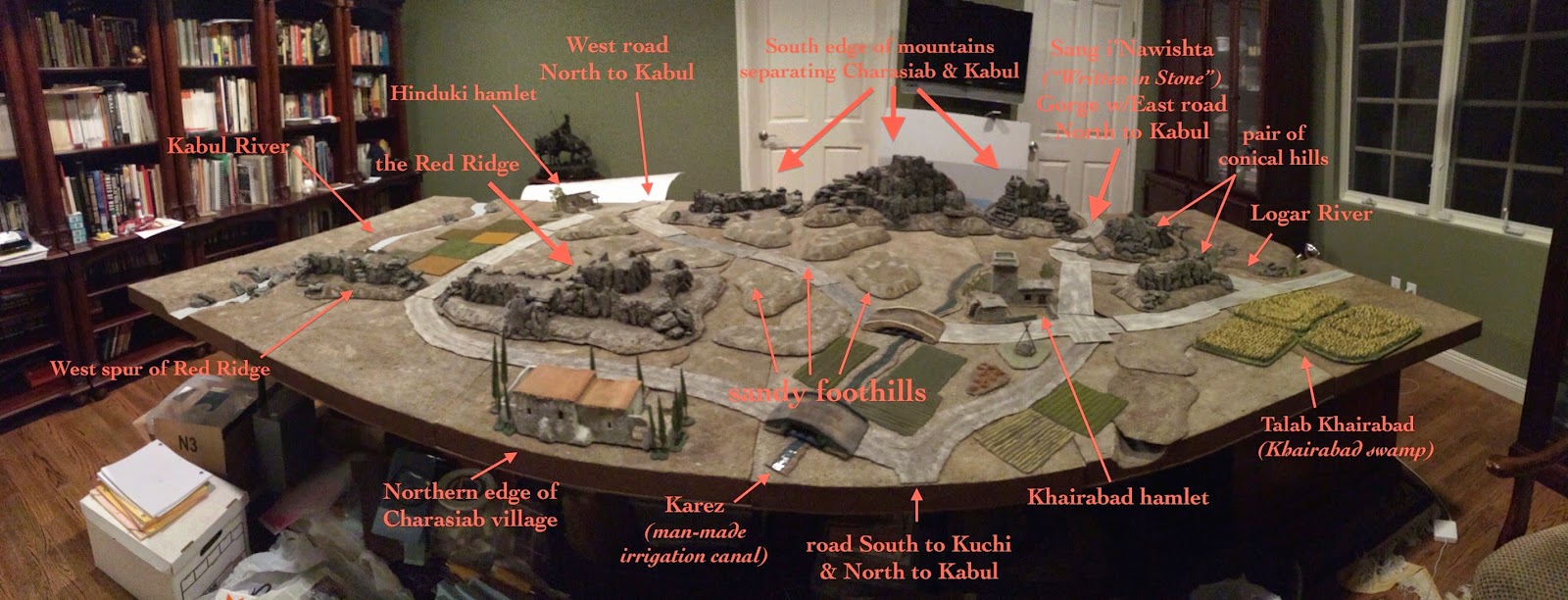Well I’m not done with my Charasiab lay-out just yet, but… I’m happy to report I am a bit closer to it!
Finished up gluing down and painting the ground-cover on the Kabul River terrain board. Before moving on to paint the river itself to match the pair of previously compelted Logar River boards, I couldn’t keep myself from laying out the whole dang thing just to see how it would look.
It’s still far from finished though! Here’s a list of what remains to be done…
(1) ROADS: Most of the roads are NOT the 3″ wide acrylic caulk roads I started making months ago and will continue making for this lay-out after I finish both rivers, instead they’re 4″ wide roads I made years ago from thin sheets of craft foam.
(2) CROP FIELDS : I need to make a lot more of these to cover the area on both banks of the Kabul River and between the Logar River and the Karez (man-made irrigation canal).
(3) EASTERN BLUFFS: I plan to build a tall, steep mountain (about 6″ wide, 30″ long, and 14″ high) to place at the North-East the edge of the table beside the East bank of the Logar River, where a large mountain stands in real life. Months ago I started prepping a big piece of cork bark for this purpose. If it works it should be a bit like a more textured 3-D version of the illustrious General Tremorden Rederring’s cardboard mountain profiles.*
(*If you’ve never seen these, I encourage you to check them out by visiting the page devoted to them on the good General’s site, now reachable only through the “WayBack” machine, by clicking here: THE MAJOR GENERAL’S MOUNTAIN PAGE. His entire site is a treasure-trove of wonders for miniature wargamers in general and Colonial wargamers in particular. The main page can be reached here: THE MAJOR GENERAL’S WEBSITE)
(4) THE VILLAGE & HAMLETS: In the pic below the Northern edge of Charasiab village, and the hamlet of Khairabad are stood in for by temporary place-holders from the set of buildings made for me a couple of years ago by Chris Riordan, AKA: Chris The Model Maker, for the 150th Anniversary Battle of Camerone game I put on. The hamlet of Hindiki (sometimes called “Hinduki” or “Indiki”) is stood in for by a couple of Pathan village buildings from Britannia/Stronghold models, which last I checked were no-longer commercially available. If you’re interested you can read a blog post I wrote about painting them back in August 2011 by clicking here:
BRITANNIA/STRONGHOLD PATHAN VILLAGE
Here’s some pics of those Camerone buildings built by Chris The Model maker in action at the 150th Anniversary game we played back on April 30th 2013:
If you’d like to see more, you can click here and pop over to my “Camerone Day” blog to see many more, you can click here:
Some nice pics of the Camerone Anniversary game
Since all these buildings — the Mexican ones and the Pathan ones — were purposefully painted to go with my terrain boards, their color schemes fit the table very well, which is why I used them instead of other Pathan village buildings I have which are nice but whose color scheme would have stood out much more.
A while back I commissioned Chris to build Charasiab, Khairabad, and Hindiki for me as well. The name Charasiab is generally translated to mean “FOUR WATERWHEELS” in Farsi, and thanks to its position between the Kabul and Logar Rivers, the village had and to this day continues to have an abundance of water-power. A while back I posted a pic labelled “Charasiab Canal” from Google Earth showing a torrential water-plume in the modern village. The waterwheels that gave the Charasiab its name are the central element of the scenic build. Knowing how talented Chris is and having seen many examples of Afghan/North-West Frontier buildings he’s created in the past, I’m very excited to see how these turn out and then be able to place them on my tabletop. But they’re not done yet, so for now a few of his Mexican village buildings are standing in, since their color scheme is a perfect match for the table.
(5) Talab Khairabad (the Khairabad Marsh or Swamp) — I’m using a few pieces of corn-field terrain to stand-in for the marsh on the bank of the Logar River. I’ve been planning since early this past Summer to custom build an “set-down” swamp, using some of the same materials I’ll be using to finish the rivers, but then about a week ago the thought struck me that after going to such lengths to build the two river boards for this battle… why not build a swamp board too? Of course the simple reply is: BECAUSE IT WILL TAKE EVEN MORE TIME AND EFFORT YOU SILLY MAN! But, having expended so much of that already, I may yet succumb to the siren call and construct a 2’x4′ board including a built-in swamp area AT AND BELOW SURFACE LEVEL rather than sitting atop it as was my original — quicker but less artful — plan. I’m still not sure on this one, but will keep you posted as the swamp progresses, one way… or another!
I’ll be back with one of my elaborate posts detailing how I finished gluing and painting the ground-cover for the Kabul River terrain-board, but for now I’m only posting this pic of the 12’x6′ lay-out, which — using the ground scale of 1″ = 50 yds. — covers about 4 miles wide by 2 miles deep, accurately recreating the size of the field in Afghanistan’s Logar Valley where the battle of Charasiab was fought on October 6th, 1879…
NOTE: please click on the photos to enlarge!
Here’s the lay-out:
…and here it is again with the notable terrain features annotated:
Similarly kilted highlanders with Pouch-Belt equipment & Martinis — and perhaps bedrolls as well — have been promised by Empress for their Anglo-Zulu War range sculpted by the also very-talented Paul Hicks, as part of their stated objective of releasing every troop type that served in the Anglo-Zulu War of 1879 and the First Boer War of 1880-81 (the 92nd were dispatched straight from having fought in Afghanistan to join the campaign in the Transvaal, so they were dressed, armed and equipped the exact same way in both wars), but there’s no sign of them arriving any time soon, so I will be buying a unit of Mike Owen’s version for use as the 92nd.





